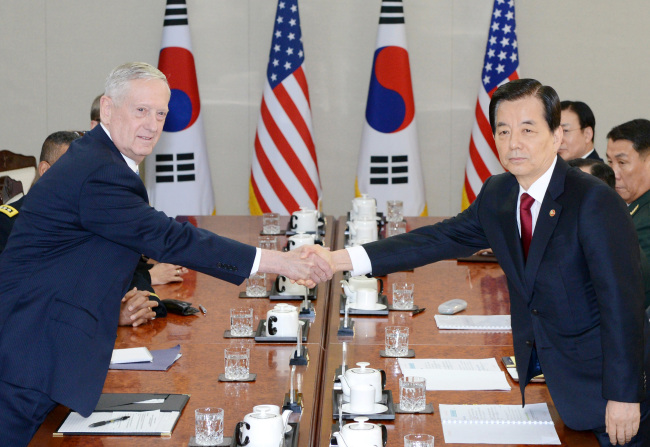The defense chiefs of Seoul and Washington on Friday vowed to deploy an advanced US anti-missile system here as planned this year to better counter North Korea’s nuclear and missile threats, dismissing the claims of China and Russia that it is directed at them.
During their bilateral talks, South Korean Defense Minister Han Min-koo and his US counterpart James Mattis reaffirmed their commitment to the alliance, warning North Korea of an “overwhelming response” should it stage additional military provocations.
“We are taking defensive steps like deploying the highly effective THAAD anti-missile unit to the Republic of Korea to protect its people and our troops that stand with our ally,” Mattis said at the outset of the meeting, referring to the Terminal High-Altitude Area Defense system.
Mattis singled out Pyongyang’s “threatening rhetoric and destabilizing behavior” as a reason for installing the anti-missile system -- not China or Russia, which have said that the deployment will undermine the regional strategic balance.
Following the meeting, Alexander Timonin, Russian ambassador to South Korea, said Moscow will take steps to protect its national security if THAAD batteries are deployed as planned, warning it will bring a “dangerous impact” to the peninsula and the region.
 |
US Secretary of Defense James Mattis (left) meets with his South Korean counterpart Han Min-koo on Friday. Yonhap |
Mattis arrived in Seoul on Thursday for his first overseas trip as the Pentagon’s chief in an apparent bid to soothe skepticism over new US President Donald Trump’s defense commitment and perceived businessman-like approach to security and alliances.
Seoul and Washington have been seeking to quicken the THAAD deployment, initially scheduled for around this summer, amid political uncertainties surrounding South Korea’s President Park Geun-hye, who was suspended from power after being impeached by the lawmaker in December.
But Han and Mattis did not spell out a specific time frame on the plan, partly because of the political impact of the issue, a Defense Ministry official here told reporters on customary condition of anonymity following the 55-minute meeting.
“It is hard to tell whether THAAD could be deployed earlier this year,” said the official, responding to the question as to whether THAAD can be deployed between April and May when South Korea could hold an earlier-than-expected presidential election if the impeachment motion against Park is upheld by the Constitutional Court.
As a part of enhanced deterrence against North Korea, the two defense chiefs decided to ramp up the level of annual Key Resolve exercise this March and plan to seek for deployment of US strategic assets to the peninsula.
During a 20-minute phone call on Wednesday, Gen. Lee Sun-jin, chairman of South Korea’s joint chiefs of staff, made a request to his US counterpart, Marine Corps Gen. Joseph Dunford, that Washington deploy strategic assets, including nuclear-capable bombers and aircraft carriers.
The issue of cost-sharing in the ally’s defense spending did not come up during the meeting, said the defense ministry official. During the presidential campaign, Trump called on Japan and South Korea to pay more for a US military presence there.
Han and Mattis lauded their first bilateral talk to demonstrate their “robust commitment” to the alliance, describing it as a “linchpin of peace and stability” in the region -- a term that was also frequently used by the Barack Obama administration.
With North Korea ramping up threats to test-fire a nuclear-tipped intercontinental ballistic missile capable of reaching the continental US, Pyongyang’s aggressive attempts would be met with an “overwhelming response,” they added.
“The fact that both countries hold defense chiefs’ meeting will demonstrate our commitment to the Korea-US alliance against North Korea’s missile and nuclear threat. It will also deliver a strong warning to the North,” Han said.
“America’s commitments to defending our allies and to upholding our extended deterrence guarantee remain ironclad: any attack on the United States, or our allies, will be defeated, and any use of nuclear weapons would be met with a response that would be effective and overwhelming,” Mattis said.
At a separate meeting with Seoul’s Foreign Minister Yun Byung-se, the secretary also said the alliance will remain “rock-solid,” saying South Korea can “100 percent count on” the US for its security commitment, including the extended deterrence.
“The United States stands by its commitment -- and we stand with our allies, the South Korean people. Our alliance is a testament to mutual commitment and respect, and it is a linchpin of peace and stability in the Asia-Pacific region,” said Mattis during the meeting with Han.
By Yeo Jun-suk (
jasonyeo@heraldcorp.com)





![[Herald Interview] 'Trump will use tariffs as first line of defense for American manufacturing'](http://res.heraldm.com/phpwas/restmb_idxmake.php?idx=644&simg=/content/image/2024/11/26/20241126050017_0.jpg)

![[Health and care] Getting cancer young: Why cancer isn’t just an older person’s battle](http://res.heraldm.com/phpwas/restmb_idxmake.php?idx=644&simg=/content/image/2024/11/26/20241126050043_0.jpg)
